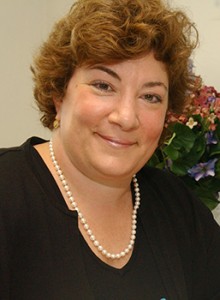Elizabeth Cohn, Ph.D., is nearing the end of an in-depth study on minority representation in clinical trials and genomic research.
Ensuring that faith leaders are knowledgeable about clinical research participation
by Bonnie Eissner

Elizabeth Cohn, Ph.D.
A study published in Cancer in 2014 revealed some troubling statistics about clinical trials funded by the National Institutes of Health. According to the study by researchers at the University of California, Davis, minorities are significantly underrepresented in such research. In fact, only two percent of the clinical trials sponsored by the NIH’s National Cancer Institute focus on any minority population. The implications of this imbalance are significant, and researchers, such as Elizabeth Cohn, Ph.D., the director of Adelphi’s Center for Health Innovation, have been looking for ways to diversify clinical trial participation.
Dr. Cohn is nearing the end of an in-depth study on minority representation in clinical trials and genomic research. Having found disparities, she and her team are now working with churches and other religious institutions that serve minority populations to ensure that leaders and congregants are knowledgeable about clinical trial participation.
While Dr. Cohn understands the medical urgency of expanding the pool of clinical trial participants, she wants to ensure that participants make an educated decision about participation. “My goal is for people to make the best decision…while still understanding the risks and benefits,” she said.
The final phase of her current study looks at how leaders of churches and other faith-based institutions in Harlem, New York, decide whether to promote specific research studies to congregants. She and her team are also developing a decision tool to help people make the call.
Dr. Cohn and her collaborators are conducting interviews, focus groups and outreach meetings with Harlem faith leaders, including ministers, pastors, first ladies and imams, as well as congregants. The purpose is to understand the questions, considerations and attitudes of those who are weighing research participation.
As an example, Dr. Cohn described her work with the Abyssinian Baptist Church in Harlem, the historic and influential church that is led by Reverend Dr. Calvin O. Butts III, who also serves as president of SUNY Old Westbury. Dr. Cohn has had a long partnership with the church and has followed its decisions about which clinical trials to promote to its members. Recently, the church’s leaders declined an invitation to participate in research that required wearing a GPS tracking system.
“That has much too high of a risk for the value that might come of it,” Dr. Cohn said, adding, “But they are a very educated church.” She aims to help other churches make similarly wise choices on behalf of their congregants.
For further information, please contact:
Todd Wilson
Strategic Communications Director
p – 516.237.8634
e – twilson@adelphi.edu